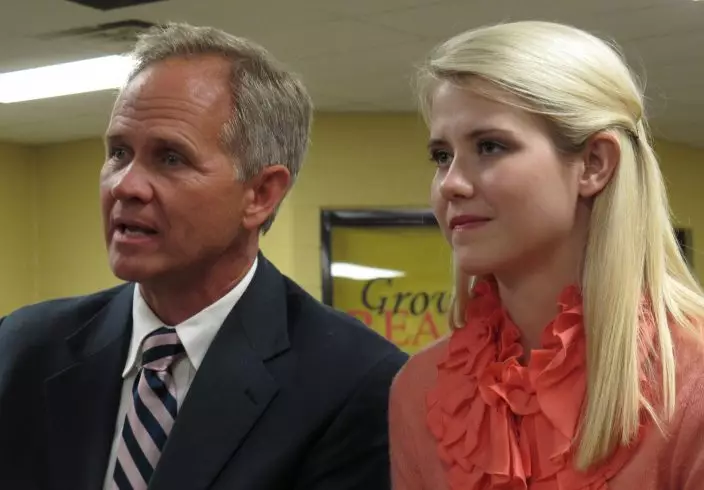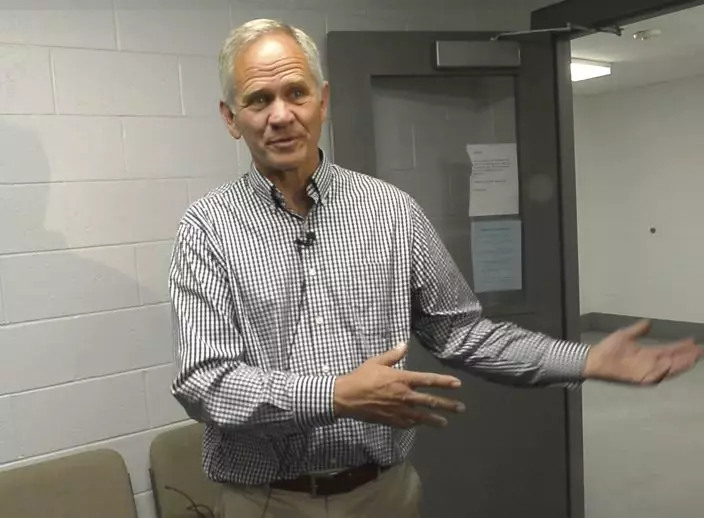The father of Utah kidnapping survivor Elizabeth Smart has come out as gay, saying his decision brings challenges but also "huge relief."
Ed Smart said in a letter shared Friday with NBC's "Today" show that he no longer feels comfortable being a member of The Church of Jesus Christ of Latter-day Saints, which opposes gay marriage and same-sex relationships but preaches love and compassion for LGBTQ people.
"The decision to be honest and truthful about my orientation comes with its own set of challenges, but at the same time it is a huge relief," wrote Smart, 64.

FILE - In this Aug. 27, 2012 file photo, Ed Smart, left, and daughter Elizabeth Smart talk to reporters before her speech at Scotts Hill High School, where missing Tennessee woman Holly Bobo graduated from, in Scotts Hill, Tenn. The father of Utah kidnapping survivor Elizabeth Smart has come out as gay, saying his decision brings challenges but also “huge relief.” Ed Smart said in a letter shared Friday, Aug. 16, 2019, with NBC's "Today" show that he no longer feels comfortable being a member of The Church of Jesus Christ of Latter-day Saints, which opposes same-sex relationships. (AP PhotoAdrian Sainz, File)
He has been in the limelight since he frequently went before TV cameras pleading for help finding his daughter, who was 14 when she was kidnapped from their Salt Lake City home in 2002.
She was found nine months later. Ed Smart and his daughter have since become advocates for other kidnapped children.
Ed Smart said he's sorry for the pain caused to his longtime wife, with whom he has five children. He filed for divorce on July 5, online Utah court records show.

FILE - In this June 12, 2018, file photo, Ed Smart talks to the media at the Utah State Prison in Draper, Utah, after a parole hearing for Wanda Barzee. The father of Utah kidnapping survivor Elizabeth Smart has come out as gay, saying his decision brings challenges but also "huge relief." Ed Smart said in a letter explaining his decision shared Friday, Aug. 16, 2019, with NBC's "Today" show that he no longer feels comfortable being a member of The Church of Jesus Christ of Latter-day Saints, which opposes same-sex relationships. (Rick EganThe Salt Lake Tribune via AP, File)
"I love my family and always will," Smart wrote. "Lois has been a loyal wife, and extraordinary mother, who has had to endure an impossible part of this journey. I deeply regret the excruciating pain this has caused her."
Elizabeth Smart, now a 31-year-old mother of three, said in a statement that she's deeply saddened by her parents' separation but that nothing could change her love and admiration for them.
"My parents taught me as a young child that they would love me unconditionally no matter what happened," she said. "Their decisions are very personal. As such, I will not pass judgment and rather am focusing on loving and supporting them and the other members of my family."
Ed Smart first came out to family and friends in a Facebook post Thursday that has since been taken down. The Deseret News newspaper in Salt Lake City first reported about the post.
He said in his statement Friday that he's grateful for the love and support he's received so far.
"It was, as I've said, incredibly hard getting to this point and I feel for so many that are struggling in my situation trying to make the decision of whether to come out or remain closeted the rest of their life," he wrote. "That decision is deeply personal but liberating."
UNITED NATIONS (AP) — Russia on Wednesday vetoed a U.N. resolution sponsored by the United States and Japan calling on all nations to prevent a dangerous nuclear arms race in outer space, calling it “a dirty spectacle” that cherry picks weapons of mass destruction from all other weapons that should also be banned.
The vote in the 15-member Security Council was 13 in favor, Russia opposed and China abstaining.
The resolution would have called on all countries not to develop or deploy nuclear arms or other weapons of mass destruction in space, as banned under a 1967 international treaty that included the U.S. and Russia, and to agree to the need to verify compliance.
U.S. Ambassador Linda Thomas-Greenfield said after the vote that Russian President Vladimir Putin has said Moscow has no intention of deploying nuclear weapons in space.
“Today’s veto begs the question: Why? Why, if you are following the rules, would you not support a resolution that reaffirms them? What could you possibly be hiding,” she asked. “It’s baffling. And it’s a shame.”
Russia’s U.N. Ambassador Vassily Nebenzia dismissed the resolution as “absolutely absurd and politicized,” and said it didn’t go far enough in banning all types of weapons in space.
Russia and China proposed an amendment to the U.S.-Japan draft that would call on all countries, especially those with major space capabilities, “to prevent for all time the placement of weapons in outer space, and the threat of use of force in outer spaces.”
The vote was 7 countries in favor, 7 against, and one abstention and the amendment was defeated because it failed to get the minimum 9 “yes” votes required for adoption.
The U.S. opposed the amendment, and after the vote Nebenzia addressed the U.S. ambassador saying: “We want a ban on the placement of weapons of any kind in outer space, not just WMDs (weapons of mass destruction). But you don’t want that. And let me ask you that very same question. Why?”
He said much of the U.S. and Japan’s actions become clear “if we recall that the U.S. and their allies announced some time ago plans to place weapons … in outer space.”
Nebenzia accused the U.S. of blocking a Russian-Chinese proposal since 2008 for a treaty against putting weapons in outer space.
Thomas-Greenfield accused Russia of undermining global treaties to prevent the spread of nuclear weapons, irresponsibly invoking “dangerous nuclear rhetoric,” walking away from several of its arms control obligations, and refusing to engage “in substantive discussions around arms control or risk reduction.”
She called Wednesday’s vote “a real missed opportunity to rebuild much-needed trust in existing arms control obligations.”
Thomas-Greenfield’s announcement of the resolution on March 18 followed White House confirmation in February that Russia has obtained a “troubling” anti-satellite weapon capability, although such a weapon is not operational yet.
Putin declared later that Moscow has no intention of deploying nuclear weapons in space, claiming that the country has only developed space capabilities similar to those of the U.S.
Thomas-Greenfield said before the vote that the world is just beginning to understand “the catastrophic ramifications of a nuclear explosion in space.”
It could destroy “thousands of satellites operated by countries and companies around the world — and wipe out the vital communications, scientific, meteorological, agricultural, commercial, and national security services we all depend on,” she said.
The defeated draft resolution said “the prevention of an arms race in outer space would avert a grave danger for international peace and security.” It would have urged all countries carrying out activities in exploring and using outer space to comply with international law and the U.N. Charter.
The draft would have affirmed that countries that ratified the 1967 Outer Space Treaty must comply with their obligations not to put in orbit around the Earth “any objects” with weapons of mass destruction, or install them “on celestial bodies, or station such weapons in outer space.”
The treaty, ratified by some 114 countries, including the U.S. and Russia, prohibits the deployment of “nuclear weapons or any other kinds of weapons of mass destruction” in orbit or the stationing of “weapons in outer space in any other manner.”
The draft resolution emphasized “the necessity of further measures, including political commitments and legally binding instruments, with appropriate and effective provisions for verification, to prevent an arms race in outer space in all its aspects.”
It reiterated that the U.N. Conference on Disarmament, based in Geneva, has the primary responsibility to negotiate agreements on preventing an arms race in outer space.
The 65-nation body has achieved few results and has largely devolved into a venue for countries to voice criticism of others’ weapons programs or defend their own. The draft resolution would have urged the conference “to adopt and implement a balanced and comprehensive program of work.”
At the March council meeting where the U.S.-Japan initiative was launched, U.N. Secretary-General António Guterres warned that “geopolitical tensions and mistrust have escalated the risk of nuclear warfare to its highest point in decades.”
He said the movie “Oppenheimer” about Robert Oppenheimer, who directed the U.S. project during World War II that developed the atomic bomb, “brought the harsh reality of nuclear doomsday to vivid life for millions around the world.”
“Humanity cannot survive a sequel to Oppenheimer,” the U.N. chief said.

United States Ambassador and Representative to the United Nations Linda Thomas-Greenfield addresses members of the U.N. Security Council before voting during a meeting on Non-proliferation of nuclear weapons, Wednesday, April 24, 2024 at United Nations headquarters. (AP Photo/Eduardo Munoz Alvarez)

FILE - U.S. Ambassador to United Nations Linda Thomas-Greenfield speaks on Thursday, April 18, 2024, in Tokyo. The U.N. Security Council is set to vote Wednesday, April 24, 2024, on a resolution announced by Thomas-Greenfield, calling on all nations to prevent a dangerous nuclear arms race in outer space. It is likely to be vetoed by Russia. (AP Photo/Eugene Hoshiko, Pool, File)













